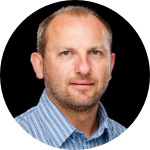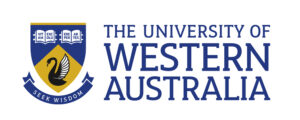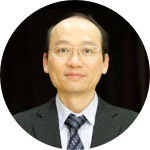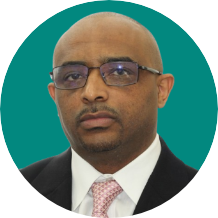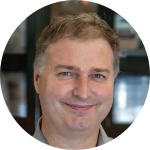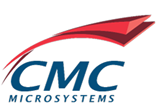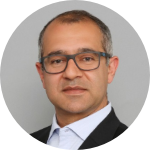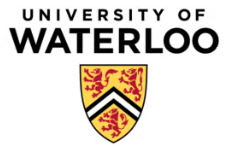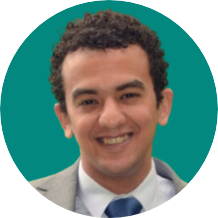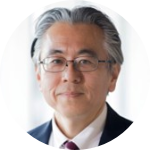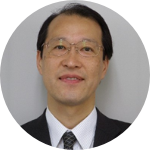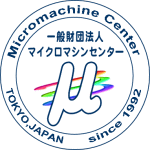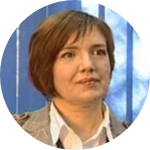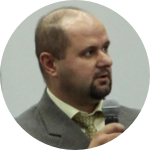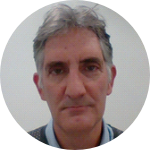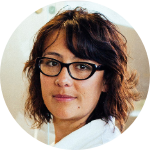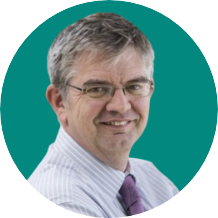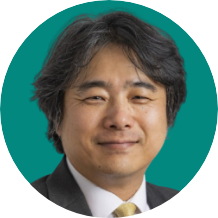DELEGATES
Country | Region
Role
Name

Australia
Chief Delegate
Mariusz Martyniuk was born in Poland. He received his B.Sc. (Hons.) degree from the University of Toronto, M.A.Sc. from McMaster University, and the Ph.D. degree from the University of Western Australia in 2007. He worked in the industry sector as an Electronics Engineer before rejoining The University of Western Australia, where he is currently with the Microelectronics Research Group and manages the Western Australian Node of the Australian National Fabrication Facility. His primary areas of interest encompass thin-film materials and thin-film mechanics, as well as their applications in micro-electromechanical systems and optoelectronic devices. Dr. Martyniuk’s research contributions were recognized by the award as a team member of the Inaugural Australian Museum Eureka Prize (the Oscars of Australian science) for Outstanding Science in Support of Defence or National Security in 2008.
Associate Professor
The University of Western Australia
Delegate
Dr. Nadia Court is a prominent figure in Australia’s semiconductor landscape, serving as the inaugural Director of the Semiconductor Sector Service Bureau (S3B). Established in 2022, S3B is a non-profit initiative aimed at bolstering Australia’s semiconductor capabilities by fostering collaboration among industry, academia, and government entities.
Before her role at S3B, Dr. Court was the Technical Director of the Research and Prototype Foundry at the University of Sydney, a key micro- and nano-fabrication facility. She also managed the Sydney Hub of the New South Wales Node of the Australian National Fabrication Facility (ANFF), contributing significantly to the development of Australia’s microfabrication infrastructure.
Dr. Court’s career includes experience in the UK, where she worked on printed electronics and optical communication technologies for the defence sector. Her international exposure has been instrumental in shaping her strategic vision for Australia’s semiconductor industry.
At S3B, Dr. Court focuses on enhancing the semiconductor ecosystem through workforce development, market intelligence, and facilitating access to global supply chains. Her leadership is pivotal in positioning Australia to play a meaningful and strategic role in the increasingly competitive global semiconductor marketplace.
Dr. Court’s contributions are widely recognized, and she continues to be a driving force in advancing Australia’s semiconductor sector.
Director
Semiconductor Sector Service Bureau (S3B)
Delegate
Prof. Dzung Dao obtained his PhD degree from Ritsumeikan University, Japan, in 2003. He then served as a Postdoctoral researcher (2003–2006), Lecturer (2006–2007), and Chair Professor (2007–2011) at Ritsumeikan. In 2011, he joined Griffith University, Australia, where he is currently a Professor in Mechanical Engineering.
With over 25 years of research experience in MEMS technology, his works focus on advanced sensing effects in semiconductors and nanostructured materials, physical sensors and actuators development, and IoT applications.
Prof. Dao has co-authored over 450 publications, contributed to 9 books and book-chapters, filed 18 patents, and supervised to completion of over 25 PhD students.
Professor
Griffith University
Delegate
A/Prof. Aron Michael Woldeghiorgis is currently Director of Academic Studies at the School of Electrical Engineering and Telecommunication in the University of New South Wales Sydney and leads MEMS research group under Microsystem research discipline. His research field of interest covers sensors and actuators, piezoelectric actuators for micro-optics, MEMS-based optical switching and interconnects, low thermal budget silicon technologies for MEMS CMOS integration, development of miniaturized high-speed parallel AFM systems on single chip, and flexible electronics. He has supervised 14 PhD students (7 to completion and 7 in the pipeline) and has been awarded more than $4M grants in his career majority as lead chief investigator.
He has published 2 scientific books and more than 120 peer-reviewed papers (Nature Partnered Journal Microsystems &Nanoengineering, Nature Partnered Journal Flexible Electronics, Sensors and Actuators A: Physical, IEEE Journal of MEMS, Nanotechnology, IEEE Sensors, etc) and held 10 invention patents.
Associate Professor
UNSW Sydney

Canada
Chief Delegate
Gordon Harling received a Bachelor’s degree in Applied Science from the University of Toronto and a Maîtrise en Ingénierie Physique from Polytechnique Montréal. He worked for ten years in Research and Development at large companies such as Mitel, NovAtel, and DALSA. Over the course of over twenty years he was founder and CEO of many start-up companies including Goal Semiconductor, Elliptic Technologies, and Innotime Technologies.
Since 2018 Mr. Harling has been CEO of CMC Microsystems, a not-for-profit which supports research infrastructure such as design tools and fabrication access for
- Microelectronics
- Microelectromechanical systems (MEMS)
- Photonics
- Artificial Intelligence/Machine Learning
- Internet of Things
- Quantum software and hardware
to colleges, universities, and SMEs worldwide.
President and CEO
CMC Microsystems
Delegate
Dr Behraad Bahreyni, SMIEEE, PEng, is a professor and the Director of the Intelligent Sensing Laboratory at Simon Fraser University, BC, Canada. He received his BSc from Sharif University of Technology, Iran, and MSc and PhD degrees in electrical engineering from the University of Manitoba, Canada, in 1999, 2001, and 2006, respectively. He was a post-doctoral researcher with the NanoSicence Centre at Cambridge University, UK, where he researched interface circuit design for microresonators. He joined SFU in 2008 after a one-year tenure in the industry as a senior MEMS design engineer. In 2016, he was with NXP Semiconductors, the Netherlands, developing advanced signal processing methods for sensing. His research activities are focused on the design and fabrication of micro/nano-sensors for applications that include consumer electronics, mining, automotive, and space exploration. Dr Bahreyni has contributed to more than 150 technical publications.
Professor
Simon Fraser University
Delegate
Raafat Mansour is a Professor of Electrical and Computer Engineering at the University of Waterloo. He held Tier 1 – Canada Research Chair (CRC) in Micro-Nano Integrated RF Systems (2010-2024) and an NSERC Industrial Research Chair (IRC) for two terms (2001-2005) and (2006-2010). Currently he holds a University Research Chair. Prior to joining the University of Waterloo in January 2000, Dr. Mansour was with COM DEV Cambridge, Ontario, over the period 1986-1999, where he held various technical and management positions in COM DEV’s Corporate R&D Department. Professor Mansour holds 44 US and Canadian patents and more than 450 refereed IEEE publications to his credit. He is a co-author of a 23-chapter Book published by Wiley and has contributed 7 chapters to five other books. Professor Mansour founded the Centre for Integrated RF Engineering (CIRFE) at the University of Waterloo https://uwaterloo.ca/centre-integrated-rf-engineering/. It houses a clean room and a state-of-the-art RF test and characterization laboratory.
Prof. Mansour co-founded with his graduate students AdHawk Microsystems and ICSPI-Corp based on CMOS-MEMS research carried out in his lab. He is a Fellow of the IEEE, a Fellow of the Canadian Academy of Engineering (CAE), a Fellow of the Engineering Institute of Canada (EIC). He was the recipient of the 2014 Professional Engineers Ontario (PEO) Engineering Medal for Research and Development and the 2019 IEEE Canada A.G.L. McNaughton Gold Medal Award.
Professor
University of Waterloo
Delegate
Hani Tawfik received his B.Sc. degree (with honors) in Electronics and Communications Engineering from Cairo University, Egypt, in 2009. He earned his M.Sc. in Nanotechnology from The American University in Cairo (AUC) in 2012, where his research focused on MEMS inertial-grade gyroscopes and silicon microencapsulation technology. In 2019, he completed his Ph.D. in Electrical Engineering at McGill University, Canada, as a recipient of the McGill Engineering Doctoral Award. His doctoral work and ongoing research interests center on designing, fabricating, and characterizing micromachined sensors and actuators, particularly capacitive micromachined ultrasonic transducers (CMUTs).
Dr. Tawfik has held teaching assistant and lecturer positions at McGill University’s Electrical Engineering Department and was nominated for the Best Teaching Assistant Award in 2015. He has contributed to over 19 journal and conference publications. In 2019, he joined MEMS Vision, serving as the Lead Product Manager, where he spearheads the development of advanced environmental and ultrasound sensors. He has also served on the executive committee of the MEMS & Sensors Technical Congress for five consecutive years, a leading event for MEMS sensor innovation.
Product Manager – Emerging Technologies
Standex Electronics

Italy
Chief Delegate
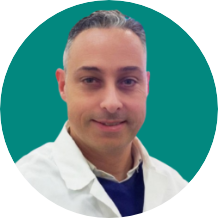
Luca Francioso received his Laurea in Physics in 2001. Since then, he has been affiliated with the Institute for Microelectronics and Microsystems of the National Research Council (CNR-IMM), working in the Sensors and Microsystems group. His research focuses on micromachined silicon systems and thin-film solid-state gas sensors. In 2008, he gained a researcher position at the Lecce unit of the Institute for Microelectronics and Microsystems (CNR-IMM), conducting research in MEMS technologies, finite element simulation, engineering of chemical sensors, and wearable devices for energy harvesting. In 2019, he was promoted to Senior Researcher and in 2023 he became Research Manager. His current research interests relate to:
- wearable devices for chemical and biological sensing
- MEMS and smart systems
- the design and fabrication of Lab-on-Chip and microphysiological platforms.
He is currently head of both the Multifunctional Devices Design and Characterisation Laboratory (M2DCLab) and the Micro-Nano BioSystems (MNBS) lab at the CNR-IMM in Lecce, leading a team of ten researchers. He has been MMS Italian delegate in the past editions and since 2025 he is chief country delegate.
Research Manager
Institute for Microelectronics and Microsystems CNR-IMM Lecce

Japan
Chief Delegate
Toshihiro Itoh was born in Japan in 1965. He received the B.E., M.E, and Dr. of Engineering degrees in precision engineering from The University of Tokyo in 1988, 1990, and 1994, respectively. He joined the faculty of the University of Tokyo in 1995. Since 2007, he has been a research manager of MEMS-related laboratory in National Institute of Advanced Industrial Science and Technology (AIST), Japan. Since 2015, he has been a professor at the Graduate School of Frontier Sciences, the University of Tokyo. Since 2020, he has been a professor of Department of Precision Engineering at the Graduate School of Engineering, the University of Tokyo. His current Research interest is in wireless sensor network technologies as well as large area MEMS.
Professor of Dept. Precision Engineering, Graduate School of Engineering
The University of Tokyo
Delegate
Toshihiro Itoh was born in Japan in 1965. He received the B.E., M.E, and Dr. of Engineering degrees in precision engineering from The University of Tokyo in 1988, 1990, and 1994, respectively. He joined the faculty of the University of Tokyo in 1995. Since 2007, he has been a research manager of MEMS-related laboratory in National Institute of Advanced Industrial Science and Technology (AIST), Japan. Since 2015, he has been a professor at the Graduate School of Frontier Sciences, the University of Tokyo. Since 2020, he has been a professor of Department of PrecisionMunehisa Takeda was born in Japan in 1957. He received the B.E. and M.E. degrees in Precision Mechanics from Kyoto University in 1979 and 1981, respectively. He also received M.S degree in Bioengineering from UCSF/UCB in 1988 and Dr. of Information Science and Technology degree in Mechano-Informatics from The University of Tokyo in 2020. He joined Mitsubishi Electric Corporation in 1981. After having held general managers of MEMS related departments at Mitsubishi Electric Corporation, he is currently the General Manager of MEMS System Development Center at Micromachine Center. He promoted several Japanese national projects related MEMS technologies such as Micromachine project, Road infrastructure monitoring system development project and High-stability ultra-low power atomic clock project. His current research interests are robotics, learning control, bioengineering, VR, micromachine, MEMS, IoT, and DX.
General Manager, MEMS System Development Center
Micromachine Center

Romania
Chief Delegate
Dr Carmen Moldovan is the Director of Research Center for Integration of Technologies (CINTECH) at IMT-Bucharest. She graduated in Electronics and Telecommunications and holds a PhD in Microsensors. She was working at Microelectronica Bucharest in CMOS Technology and later on joined IMT-Bucharest as Head of Laboratory of Microsystems for biomedical and environmental applications, working in simulation, design, technology and characterization of MEMS devices, micro-nanosensors, microsystem integration, data acquisition and signal processing. She was/is involved in 25 EU Projects and 35 National Projects and published more of 130 papers. She owns several EU and National patents. She is currently Coordinator/ Principal investigator in five Horizon Europe projects in the field of sensors and microsystems for environmental and biomedical monitoring and implantable devices. Among them, the coordination of NerveRepack “Intelligent neural system for bidirectional connection with exoprostheses and exoskeletons”, a HORIZON-KDT-JU-2022-RIA project with 27 participants and 10 countries involved.
Carmen is coordinating the Romanian Center for International cooperation in micro nanotechnologies (CESMIN) within IMT-Bucharest.
She is also coordinating the Romanian Centre of competence in Smart Systems for Sensing and Robotics (RO-SMARTSYS) in the frame of “DIGITAL-Chips-2024-SG-CCC-1” call.
Director of Research Centre
National Institute for R&D in Microtechnologies
(IMT-Bucharest)
Delegate
Dr. Adrian Dinescu obtained the MSc and PhD degrees in solid state physics from Faculty of Physics, University of Bucharest. Between 1993 and 1997, he was with the National Institute for Electronic Components Research, working in the field of optoelectronics. Since 1997 he is with IMT-Bucharest, currently being CEO and President of the Board. Adrian Dinescu was the head of Nanoscale Structuring and Characterization Laboratory for seventeen years and Technical Manager of IMT for five years. Dr. Dinescu is involved in the micro and nanoscale characterization using FE-SEM and in structuring at the nanoscale using Electron Beam Lithography. His expertise also includes: micro and nanofabrication, thin film deposition and optoelectronic measurements. He has co-authored more than 150 papers in refereed international journals and coordinated 15 national and 3 European research projects.
Director of IMT Bucharest
National Institute for R&D in Microtechnologies
(IMT-Bucharest)
Iberian
Chief Delegate
Dr. Luis Fonseca was born in Barcelona, Spain, in 1966. He received his Ph.D. degree in Physics from the Autonomous University of Barcelona in 1992. He has developed his professional career in the Barcelona site (IMB) of the National Center of Microelectronics (CNM). He worked as a process engineer at the CNM production facilities, until he joined the Microsystems department as a full senior researcher in 2001. His field of work was initially infrared gas sensing and, nowadays, microenergy harvesting and generation, particularly micro thermogenerators based in thin films or low dimensional materials (i.e. Si NWs).
He has been deputy director of the institute in the period June 2012-June 2016, and he is its current director since May 2021; he is member of the Steering Committee of the European Technology Platform on Smart Systems (EPoSS) since June 2008.
Research Professor
Institute of Microelectronics of Barcelona
National Centre of Microelectronics (IMB-CNM)
Delegate
Since 1990 Carles Cané is senior researcher at the National Microelectronics Centre. He started working on CMOS technologies and later he evolved to MEMS, physical sensors and wireless sensor networks. Today, he is involved in the development of new gas sensors and advanced materials for a variety of applications, such as environment, indoor air quality, agrifood, industrial security and home appliances.
In the past, he has been director of the Institute of Microelectronics of Barcelona (IMB-CNM), and of the Spanish Large Scale Facility MICRONANOFABS. Concerning Research Management, he has been Project Officer for the Spanish Programme on Microelectronics and Communications, and has acted for 20 years as representative of the Spanish Ministry of Science in the NanoMaterials an ICT Clusters of the European Commission Framework Programmes.
Finally, Carles Cané is proud to have been Chief Delegate of the Iberian Delegation at the MicroMachine Summit until 2019.
Research Professor
Institute of Microelectronics of Barcelona
National Centre of Microelectronics (IMB-CNM)
Delegate
S. Vallejos (BSc in Electronics Engineering, 2003; Ph.D. in Electronics Engineering, 2008) is a Tenured Scientist at the Spanish National Research Council (CSIC) and the coordinator of the Gas Sensor Group at the Institute of Microelectronics of Barcelona (IMB-CNM). She has held research positions in both academia and industry across Spain, the UK, and the Czech Republic and has been awarded competitive research projects and fellowships.
S. Vallejos is an expert in gas sensor technologies and functional materials and has also extensive experience in microsystems, thin-film technologies, and the application of gas sensors in field. Her current work focuses on integrating these technologies to achieve higher Technology Readiness Levels (TRLs) in collaboration with key industrial partners through major projects such as AGRARSENSE (HORIZON-Chips-JU), SENFORFIRE (Interreg-Sudoe), and a VISENS contract under the European Innovation Partnership for Agricultural Productivity and Sustainability (AEI-AGRI, Catalonia).
Her outreach activities extend to conferences, workshops, lectures, and motivational talks, particularly aimed at inspiring young women in STEM. Her research has been widely published, with most results appearing in top-tier journals, accumulating over 2,409 citations as of February 2025 (Scopus).
Tenure Scientist
Institute of Microelectronics of Barcelona
National Centre of Microelectronics (IMB-CNM)
Delegate
Professor Alexandra Bermejo earned the M.Sc. in Electrical Engineering and the Ph.D. degree in 2000 and 2004 respectively. Between 2015 and 2023, she served as the Vice Dean of the Barcelona School of Telecommunication Engineering (ETSETB) at the Universitat Politècnica de Catalunya (UPC). Her research is developed within the Electronic Engineering Department at UPC, where she leads the electro-kinetics research group. Her research objectives primarily revolve around the advancement of technology tailored for the production of functional nano-devices through electrowetting, electrospray, and electrothermal techniques, with applications spanning the domains of photonics, energy, and sensing. The research group specializes in fabricating metamaterials designed for energy and sensing applications, encompassing diverse energy harvesting and storage devices, along with the formulation of electrolytes tailored for energy, humidity, and proximity sensors. She has actively contributed to a total of around 30 competitive research projects, both at the national and European levels, leading four of them. She has managed four technology transfer projects with IT companies and research centers. She is author of more than 50 international journal papers, more than 60 conference contributions and holds three patents.
Professor
Universitat Politècnica de Catalunya

United Kingdom
Chief Delegate
I am currently Professor of Advanced Sensor Technologies and Head of the SEMS (Smart Electronic Materials and Systems) group in the School of Electronics and Computer Science (ECS) at Southampton University.
My research interests have a strong commercial focus, and previous positions before Southampton have been in industry based research and consultancy organisations, so I have a good understanding of the drivers of technical research. My research has focussed on emerging disruptive technologies, such as lab on a chip medical devices,energy harvesting sensor systems, and more recently low cost distributed sensors for land use monitoring and control. I have strong links with the University of Western Australia and the Luxembourg Institute of Science and Technology, collaborating in developing technology for significant socio-economic impact, by enabling real-time ecohydrological measurements. My publication record is excellent with many peer reviewed publications and patents, and I have a good track record of raising grant funding. I am a founder of Perpetuum Ltd, a spin out from ECS that has successfully commercialised vibration energy harvesters for condition monitoring applications, and was involved in writing the business plan, and negotiating the initial fund raising. Perpetuum was sold in 2020 to Hitachi in a trade sale. I previously held a directorship of D4 Technology Ltd, a consultancy company, whose customers included Dstl, Lockheed Martin, GE Global Research, Perpetuum and Staywell, as well as previously being a director of ECS Partners, the consultancy operation of ECS. I am a Fellow of the IET (FIET) and a chartered engineer (CEng).
Professor
University of Southampton
Delegate
Dr Yoshishige Tsuchiya is an Associate Professor in the School of Electronics and Computer Science (ECS), University of Southampton. He received a PhD from the University of Tokyo, Japan, where he held JSPS fellowship working on exotic superconductors. He joined the Tokyo Institute of Technology as an Assistant Professor in 2001, where he developed a novel Si nanoelectromechanical (NEM) memory and Si quantum-dot single electron transfer devices under the JST 10-year ‘Neo-Silicon’ project. Since he came to Southampton in 2008, he has developed integrated Si NEM mass sensors in EU FP7 NEMSIC, Si spin-qubit devices in EPSRC SISSQIT, and energy-reversible NEM switches in EPSRC NOVTLOS. He has collaborated with industrial partners Hitachi, NTT, or Honeywell, and also internationally with EPFL, CEA-Leti, IMEC, TU Delft, NIMS, and RIKEN. He is the project coordinator of the Chist-Era NOEMIA (2023-2026) to develop novel Nano-Opto-Electro-Mechanical Systems (NOEMS) for energy-efficient computing in collaboration with IEMN in France, NTU in Taiwan, RTU in Latvia, and ITCAS in Czechia. He is also the UK PI of EPSRC-JST UK-Japan Semiconductor HetMEPS project (2024-2028) to develop MEMS/NEMS-photonics heterogeneous integration platform. He is a Co-I of an EPSRC PhD studentship programme of Centre for Doctoral Training in Quantum Technology Engineering (CDT-QTE, 2024-2033). He has strong technical expertise on silicon nanodevice design and fabrication, quantum devices, NEM devices, NOEMS, and nanoscale imaging. He is a Fellow of Higher Education Academy, and a member of IoP, IET, and IEEE. He has published 190 peer-reviewed journal and conference papers.
Associate Professor
University of Southampton


